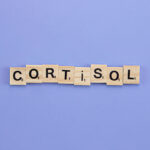The Role of Cortisol in Sleep
The human body produces dozens of hormones and each one is responsible for regulating and controlling specific biological processes essential for human life. One such hormone is cortisol. This steroid hormone is produced by the adrenal glands located near the top of your kidneys. While cortisol plays a crucial role in several bodily functions, its main purpose is regulating the body’s response to stress, which is one reason it’s often referred to as the stress hormone.
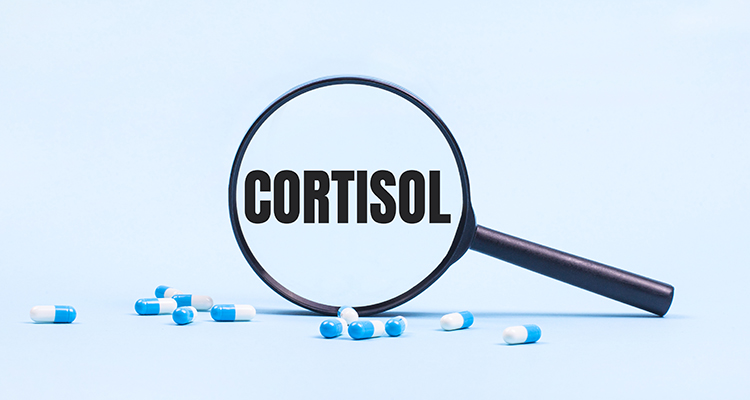
Cortisol levels also impact your sleep quality, sleep duration, and your risk of developing certain sleep disorders. In this article, we’ll take a closer look at the hormone cortisol, how it works inside the body, and what role it plays in your ability to achieve deep restorative sleep. Armed with this knowledge, you can make the necessary changes to improve your sleep and overcome insomnia once and for all!
Content
What is Cortisol and What Does it Do?
Cortisol is an important and complex hormone that regulates various bodily functions from stress and inflammation to sleep. Cortisol is produced by the HPA (hypothalamic pituitary adrenal axis) which includes the pituitary and hypothalamus glands located in your brain. It also includes your adrenal glands located near your kidneys.
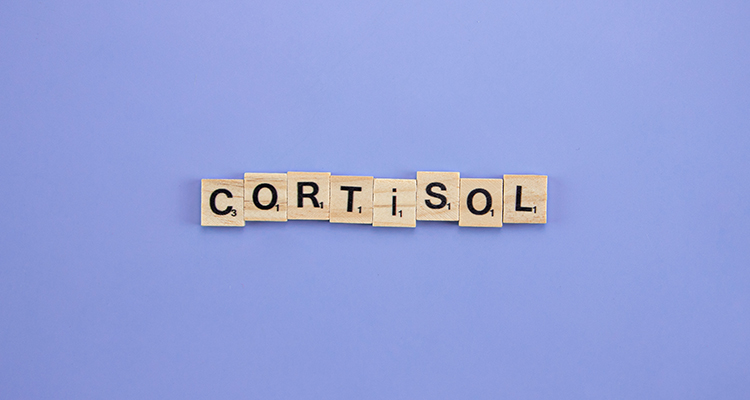
When your body experiences stress, the hypothalamus gland sends a signal to the pituitary gland by releasing another hormone known as corticotropin or CRH. CRH stimulates the pituitary gland, sending another hormone called adrenocorticotropin (ACTH) into your bloodstream. As ACTH travels through your blood and reaches your kidneys, it then signals the adrenal glands to produce and release cortisol. This process halts once the adrenal glands have produced a sufficient amount of cortisol. If this process sounds complex that’s because it is! But knowing how it works can help you better understand the effects cortisol has on your body, mind, and sleep patterns.
Another key function of cortisol is increasing sugar or glucose levels in your blood. This enhances how your brain uses glucose to repair important tissues within the body. Cortisol also controls your body’s fight-or-flight response, which is commonly linked to stress. In certain situations, reacting inappropriately to stress can be harmful. Cortisol works to ensure this doesn’t happen. The more stressed you are, the higher your cortisol levels become. As you begin to calm down and become more relaxed, these levels decrease.
As cortisol levels rise in response to stress, you’ll notice several physical changes including
- A spike in blood sugar levels
- Increased heart rate
- Heightened senses
- Rapid breathing
In addition to these fight-or-flight responses, cortisol can also affect your mood, support immune function, reduce inflammation, and facilitate metabolism and digestive functions.
Cortisol also plays an important role in maintaining a healthy sleep-wake cycle or circadian rhythm which is essential for achieving restorative sleep.
The Connection Between Cortisol and Sleep
Aside from the fact that stress can directly impact your ability to fall and stay asleep, the stress hormone cortisol has other important impacts on your sleep-wake cycle. One reason is that both stress and sleep share the same pathways within the human body. When something interrupts the function of your HPA axis, it can simultaneously disrupt your sleep cycles.

Your body progresses through several different sleep cycles and stages throughout the night. While there’s some debate over exactly how many stages of sleep there are, most experts agree that there are 3 non-REM sleep stages followed by one REM sleep cycle.
The 3 non-rapid-eye-movement sleep stages consist of the following:
Stage 1 – Only lasts for a few minutes and is marked by your transition from a state of wakefulness to a state of sleep.
Stage 2 – Your body begins to relax as you settle into your sleep. Your body temperature decreases and your brain waves become increasingly slower. Studies show that people spend 50% of their sleep time in this sleep stage.
Stage 3 – This non-Rem sleep stage is also referred to as “slow wave sleep”. During this stage, your breathing, heart rate, and brain waves are at their slowest.
The REM sleep cycle is usually the last sleep stage and the one where you experience vivid dreams. During this sleep stage, your body becomes partially paralyzed as your brain is at its most active. Each sleep cycle lasts approximately 90 minutes as your body moves through these 4 sleep stages several times. Deep, slow wave sleep tends to occur during the first half of the night whereas REM sleep is more likely during the second half of your sleep cycle.
Each step in the process is extremely important for restoring your muscles, improving cognitive function, and regulating your mood. Chronic sleep deprivation can lead to a variety of health complications and put you at greater risk of developing certain ailments and illnesses.
When the HPA axis is overly active, it can disrupt your body’s ability to naturally progress through each sleep cycle. This can lead to insomnia, poor sleep quality, shortened sleep duration, and fragmented sleep. In turn, lack of sleep can negatively impact the function of your HPA axis, interrupting cortisol production. Patients with insomnia and other sleep disorders may produce increased cortisol levels during the day. Certain researchers believe this is your body’s way of trying to remain awake and alert.
This would make sense given that cortisol levels are generally highest in the morning, as the hormone works to trigger arousal. As the day progresses, your cortisol levels naturally decrease. Shift workers that sleep during the daytime and awake in the afternoon or at night will see this same natural progression of higher cortisol levels during their awake hours and dips as their day nears an end, regardless of the time. It’s also important to note that as your cortisol levels naturally decrease, your body starts to produce the sleep hormone melatonin as a response to darkness and as a way to prepare your mind and body for sleep.
What Factors Affect Cortisol Levels?
Stress and time of day aren’t the only things that can cause a spike or dip in cortisol levels. Your body’s HPA axis, which controls cortisol levels and production, can be impacted by several different factors. You may notice that many of these conditions also affect a person’s overall health and well-being, which is one reason a cortisol imbalance can lead to sleep troubles.

Sleep Disorders
High cortisol levels and many sleep disorders go hand in hand. For example, obstructive sleep apnea (OSA) can negatively impact the HPA axis and cause unwanted spikes in cortisol levels. One study of OSA patients that also used a CPAP (continuous positive airway pressure) machine showed that when these machines were removed, patients experienced elevated cortisol levels and blood glucose levels. This evidence suggests that certain sleep disorders may put you at greater risk of spikes in cortisol levels and the complications that accompany them.
Diet
They say you are what you eat. The food you consume can directly impact your body’s ability to maintain healthy cortisol levels. In fact, research suggests that diets high in fat, salt, refined sugar, and animal proteins can significantly impact the circadian production of cortisol. Replacing these foods with fruits, vegetables, and other nutrient-rich foods can help maintain healthy cortisol production rhythms that also support consistent sleep patterns.
Stress or Trauma
It should come as no surprise that both stress and certain traumatic events can directly impact cortisol levels within the body. The type of stressful event plus its duration both determine exactly how high your cortisol levels spike and for how long. For example, a short-term stressful event like a final exam or presentation can cause an initial jolt in cortisol that returns to normal levels rather quickly.
In the event of chronic or ongoing stress, the impact on both cortisol levels and how your HPA axis functions can last for longer periods of time. For some trauma patients, cortisol levels remain too high for too long, causing long-term side effects while other people experience a chronic dip in cortisol levels instead. It’s also interesting to note that people who have survived a variety of traumatic experiences often exhibit lower-than-normal cortisol levels. The earlier the trauma occurs, the more permanent its effects on both cortisol levels and HPA function.
Cortisol levels in trauma survivors tend to flatline or remain at a steady level instead of fluctuating up and down in response to external factors and stressors. This could be due to an increase in cortisol receptor sensitivity as a way to compensate for chronic stress and adapt to the aftereffects of the trauma.
Addison’s Disease
Addison’s disease is a rare condition also referred to as primary adrenal insufficiency. This condition occurs when the adrenal glands fail to produce sufficient levels of cortisol. Several factors can cause this condition including an infection, certain cancers, or an autoimmune condition.
Secondary adrenal insufficiency is more common than Addison’s disease and is linked with pituitary gland issues. A healthy pituitary gland releases ACTH, triggering your adrenal glands to produce cortisol as needed. When this gland doesn’t work properly, it fails to signal cortisol production in times of need. Over time, without adequate stimulation, your pituitary glands may shrink and fail to work at all.
Cushing’s Disease or Cushing’s Syndrome
Cushing’s disease and Cushing’s syndrome are both linked to a chronic overproduction of cortisol, although each condition has a different cause. Cushing’s syndrome is the result of long-term use of high doses of corticosteroid medications including prednisone. Injectable steroids used to treat joint and back pain can also cause Cushing’s syndrome. The higher the dose, the greater your risk.
Cushing’s disease, on the other hand, is often caused by a tumor or abnormality in the pituitary gland causing high levels of ACTH production. An increase in this hormone triggers the gland to produce more cortisol than it needs for healthy functioning.
Signs and Symptoms of High Cortisol Levels
If you suspect that your sleep troubles are caused by higher-than-normal cortisol levels, you may be exhibiting signs and not even realize it. Here are some early warning signs and symptoms that you may be experiencing an unhealthy increase in cortisol levels.

- Inability to fall and stay asleep (insomnia)
- Unexplained weight gain
- Noticeable changes in your metabolism
- Depression or anxiety symptoms
- Mood swings or irritability
- Inflammation
- Headaches
- Heart disease
- Flushed face
- Changes in the appearance of your skin (purple stretch marks or bruising)
- Increased blood pressure
- Weak muscles
- Increased urination
While these symptoms may be a sign of various underlying health conditions, if you’re exhibiting more than a few of these symptoms alongside trouble sleeping, a spike in cortisol levels could be to blame.
Testing for High Cortisol Levels
The good news is that you can test for high cortisol at home before seeing a doctor. There are a few ways to test your cortisol levels to determine if they’re in a healthy range, with the most common including saliva and urine tests. If you do visit a medical professional, they may order a blood test as well.
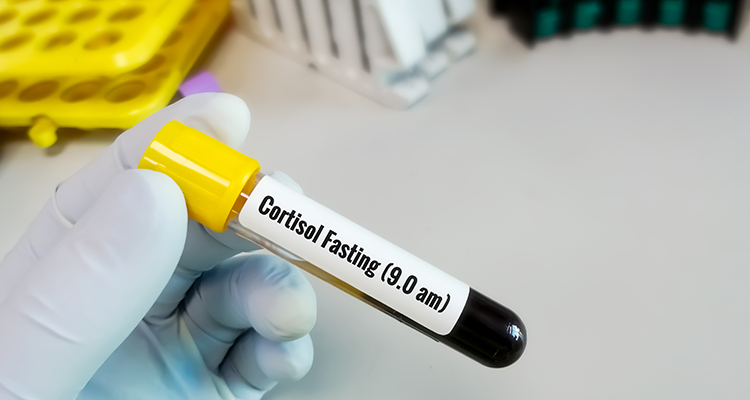
Saliva Test
Cortisol saliva tests measure the free cortisol in your body, which is the cortisol that’s not attached to proteins. This is done by collecting a saliva sample at night to screen for Cushing’s syndrome and any other underlying health issues that could be causing a spike or fluctuation in cortisol levels.
Urine Test
Similar to a saliva test, urine cortisol tests also measure the level of free cortisol that’s not attached to proteins in your urine. Instead of collecting a single sample at night, patients are required to collect and test their urine three to four times over the course of a 24-hour period. These tests are designed to show how your cortisol levels change and fluctuate between the day and night. This data can help provide important insight into potential stressors, triggers, sleep troubles, and more.
Blood Test
Cortisol blood tests are usually performed in a lab and are not available for home use. These tests can measure both free cortisol and total cortisol, which includes those levels attached to proteins in your body. Doctors use blood cortisol tests to diagnose specific conditions that may be impacting your sleep like adrenal insufficiency in people with serious illnesses including respiratory distress syndrome and pneumonia.
Tips for Lowering Cortisol Levels
Once you determine that high cortisol levels are what’s causing your sleep troubles, you can start to take the necessary measures to get these levels under control. Many of these strategies can be safely done at home without the need for medication. Confirm with your doctor though before trying any of the following techniques.

- Eliminate cortisol-triggering foods from your diet like those high in fat, salt, and sugar
- Incorporate moderate-intensity exercise into your daily routine
- Reduce stress and anxiety through meditation, mindfulness, and other holistic practices
- Consider CBT therapy to reduce stress and improve sleep
- Speak with your doctor about using selective serotonin reuptake inhibitors (SSRIs) that may counteract flatline cortisol levels caused by trauma or stress
- Try a fish oil or ashwagandha supplement
Tips for Naturally Achieving Better Sleep
Getting your cortisol levels under control isn’t the only way to improve sleep quality, although it’s a good start. As you work to determine the cause of your cortisol imbalance, these lifestyle changes can help you achieve better sleep, which may in turn reduce stress and support healthy cortisol production.

Create a Sleep Schedule
Create a consistent sleep schedule that involves going to bed and waking up at the same time each day. Doing so can help balance your circadian rhythm which may be negatively impacted by high or low cortisol levels.
Adopt a Nighttime Routine
As humans, we thrive on routine and predictability. By creating a relaxing nighttime routine, your body will start to recognize these behaviors and activities as triggers for sleep. For example, try running a warm bath using essential oils at the same time each night. Adding lavender or ylang-ylang can help promote calm, relaxation, and sleep. You can also write your thoughts or to-do list in a journal to help purge negative or anxious thoughts before bed. Meditate, drink chamomile tea, or perform a low-intensity yoga routine.
Try to perform these steps in the same order, at the same time each night. Not only will you experience less stress and deeper sleep, but you may find it easier to drift off to sleep after climbing into bed.
Avoid Blue Lights
Most people are guilty of using their cellphones, computers, or watching television before bed. While you might think these are suitable ways to wind down and relax, the blue light from these digital devices can interrupt your body’s natural production of melatonin, making it difficult to fall and stay asleep. Exposure to blue light too close to bedtime tricks your brain into thinking it should be awake and alert instead of preparing for sleep. Try putting down all electronic devices at least 90 minutes before going to bed. This can help support your body’s natural transition from being awake to being asleep and, in turn, promote healthy cortisol levels as they dip at night to facilitate sleep.
Create the Ideal Sleep Environment
If your bedroom is too bright, too loud, or even too messy, it can be aggravating your sleep troubles without you even realizing it. One way to promote a good night’s sleep is by creating a relaxing and welcoming sleep environment. Your bedroom should be a calming oasis free of clutter and external stimuli.
Reduce noise disturbances using sleep headphones, a sound machine, or an oscillating fan that creates white noise. Block out unwanted light disturbances by wearing a sleep mask or hanging room darkening shades. You should also buy a quality mattress and pillows that offer the support your body needs and help you achieve a comfortable sleep position. The bedding you choose is also important. Lightweight and breathable sheets and blankets are best for maintaining a low core temperature, which is crucial for achieving quality sleep.
Choose Healthy Drinks and Snacks
Eating meals that are high in fat and sugar or too heavy before bed can cause a variety of sleep disturbances including heartburn, gas, bloating, and frequent bathroom trips. If you need a snack before bed, make sure it’s light and healthy. It’s also important to avoid stimulating or caffeinated beverages too late in the day. Coffee, tea, sports drinks, and energy drinks consumed even in the late afternoon can trigger sleep disturbances.
While some people use alcohol as a way to relax at night and make it easier to fall asleep, the truth is alcohol acts as a stimulant. Once the sedating effects wear off, most people find themselves restless and unable to achieve deep sleep. Swap these less-than-healthy beverage options for a cup of chamomile tea which is known for its calming and sleep-inducing benefits.
Reduce Stress and Welcome Deep Blissful Sleep
Did you know that stress and anxiety are the leading causes of insomnia in adults? While most people experience mild stress at least a few times per week, individuals with chronic stress, PTSD, and other anxiety disorders may be faced with additional barriers to sleep. Trauma can cause unhealthy spikes in cortisol levels or a flatline, both of which may disrupt sleep. If you think unhealthy cortisol levels are to blame for your sleep troubles, contact a medical professional to perform a cortisol test and discuss treatment options.
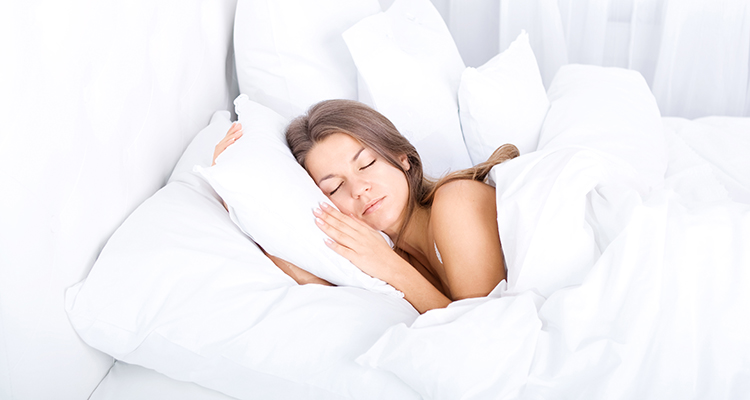
If you’re ready to start adopting healthier patterns of behavior that facilitate and promote deep sleep, click here and learn how Somnus Therapy’s online sleep therapy program can help.
https://www.everlywell.com/blog/sleep-and-stress/cortisol-and-sleep

